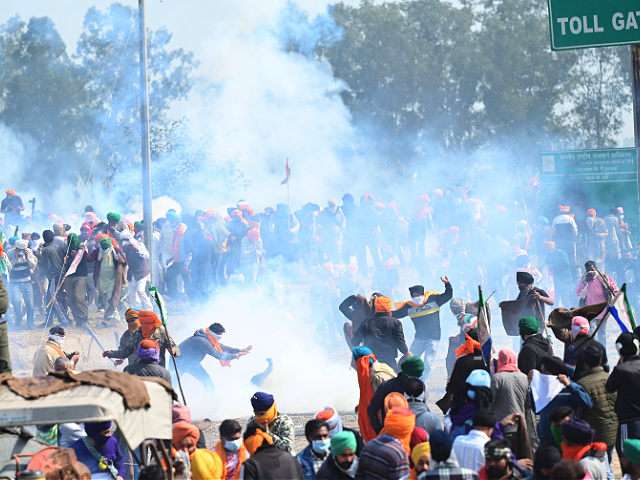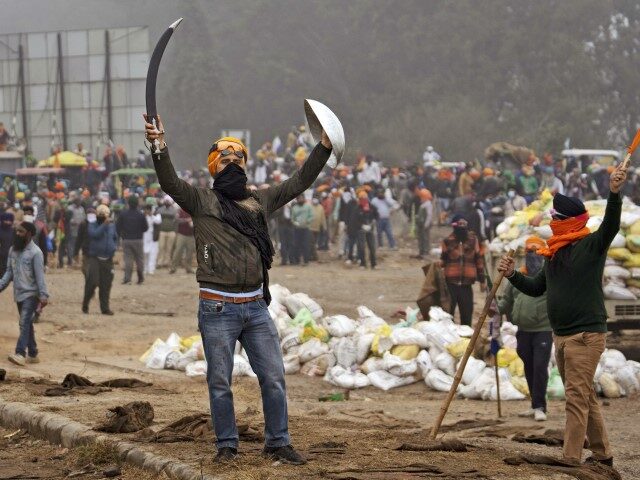Indian farm protesters burned Prime Minister Narendra Modi, Home Minister Amit Shah, and other officials in effigy on Friday as part of “Black Day” – basically a huge tractor rally with black flags fluttering from the farm equipment, intended to keep attention focused on the demonstrators as government troops block them from completing their planned march to New Delhi.
The farmers began their protest march over a week ago, reprising a demonstration that lasted for an entire year in 2021. The previous marchers demanded the repeal of contentious agricultural reforms. The farmers have more demands this time, most importantly including demands for a guaranteed minimum “support price” to be paid by the government for their crops, plus they say the government failed to deliver on some of the promises it made in 2021.
The farmers wound up encircling New Delhi with semi-permanent protest camps last time, so this time the police were determined to stop them before they could reach the city. Violent scuffles broke out between demonstrators and police on Wednesday, leaving a dozen officers injured and a 21-year-old protester dead.
The “Delhi Chalo” protest march halted about 125 miles from New Delhi, so the farmers pitched tents, set up community kitchens, brewed up gigantic vats of milk tea, and dug in for the “long haul.”
Mindful of how the protesters used their tractors to smash through flimsy barricades last time, the police constructed walls of concrete blocks and razor wire to hold the farmers at bay, periodically showering them with tear gas when they came too close to the walls.

Haryana Police fired Tear gas shells to stop protesters to came near the barricades during the Farmers Protest at Shambu Border of Punjab and Haryana near Ambala on February 14, 2024, in Chandigarh, India. (Ravi Kumar/Hindustan Times via Getty Images)
On Thursday, farm leaders rejected an offer of $120,000 in compensation from the police to the dead man’s family, and said they would hold “Black Day” rallies all along the protest line on Friday. Most of the farmers are Sikhs, so they added black cloth to their turbans in addition to hanging black flags on their tractors.
Also on Friday, a battalion of Nihang Sikh warriors deployed to the protest line, vowing to protect the farmers from the excessive force used by the police.
The Nihang, or “Immortals,” are a nomadic militaristic sect that lives in temporary camps, dresses in flowing period robes, and fights with traditional weapons such as swords, spears, and shields. The sect was established by the tenth great spiritual leader of the Sikhs, Guru Gobind Singh, in 1699. They were considered one of the more formidable fighting forces of their day.
Modern Nihang spend much of their time putting on fairs during which they show off their horsemanship and skill at an acrobatic martial arts style known as gatka.
The Nihang are emphatic that gatka is not just for show, they have sharp swords and spears in their inventory, and they are not afraid to use them for a righteous cause.
“Guru Gobind Singh has preached that Sikhs must always be ready to fight injustice and oppression. We have to be prepared if these protesters face any trouble even in the middle of the night,” Nihang leader Sher Singh told Reuters on Friday.
“Farmers are being oppressed,” said another Nihang, Raja Ram Singh. “The government must not think that they can scare the farmers away.”
“We are with the people who are oppressed, even if that means we die,” Nihang warrior Rann Fateh Singh told Agence France-Presse (AFP) on Thursday.
The Nihang have been known to use lethal force against people accused of sacrilege against holy sites and artifacts. During the 2021 farm protests, three Nihang were arrested for allegedly killing a laborer, tying his body to a barricade, and hacking off his legs and hands. The sect was unapologetic for the killing, saying the laborer disrespected a holy book.
On Thursday, social media platform X admitted to taking down accounts and posts related to the farm protests under “executive orders” from the Indian government. Several complaints have been filed by prominent activists and journalists claiming their accounts were blocked.
X management said it disagreed with the Indian government’s censorship order and has filed a legal challenge against the “blocking orders,” but that in the meantime it must comply.

COMMENTS
Please let us know if you're having issues with commenting.